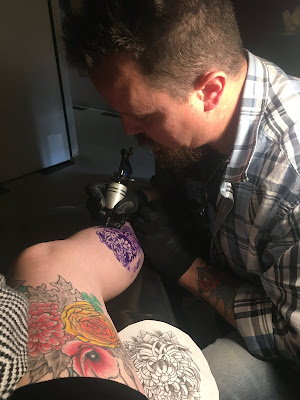Welcome to another installment of TNBBC's Where Writers Write!
Where Writers Write is a series in which authors showcase their writing spaces using short form essay, photos, and/or video. As a lover of books and all of the hard work that goes into creating them, I thought it would be fun to see where the authors roll up their sleeves and make the magic happen.
This is Alex Myers.
Alex is a teacher, speaker, writer, and advocate for transgender rights. Since coming out as transgender in 1995, he has worked with schools across the country, helping them create gender inclusive policies, practices, and facilities. Alex's essays have appeared in the Guardian, Slate, Newsweek, Salon, and variety of other journals. He has published two novels, Revolutionary (Simon & Schuster, 2014) and Continental Divide (The University of New Orleans, 2019), as well as a third, The Story of Silence, forthcoming from HarperCollins (2020). Alex teaches English at Phillips Exeter Academy.
Where Alex Myers Writes
It isn't pretty. It isn't fancy. But it works for me. What
is it? It's my father's old desk with an ikea tv stand on top of it, which makes
it the perfect height for me to stand at to type or write by hand. It's a heap
of paper and notes, all of it totally messy to an outsider and completely
organized to me.
I've got a window that looks out into a parking lot; the
afternoon light is great. I've got two cats who vie to sit on the desk whenever
the heat is on (the radiator is right there underneath) or whenever the trash
is being picked up in the parking lot (somehow, they think they can take on a
trash truck).
Something you might not notice: the dark stain on the wood
floor right in front of the desk. That's where I stand. Where my feet hit the
ground. I mostly stand there barefoot, and maybe the mark is a testament to the
corrosive properties of my foot sweat, but I like to think that it actually
speaks to how much I stand there. Every day. At least for a little bit.
In an ideal world, I could write anywhere, and sometimes I
have to. But the truth is, this is my happy writing spot. Everything I need is
close at hand; I'm used to the noises the space makes, the light across the
desk, the warmth of the room. When I write in the afternoon, I can watch the
sunset, and this view is how I mark the seasons; I catch the first yellow-green
of spring fuzz on the maple tree; I watch the progress of the shadows across
the roof as the sun roams the sky in summer. Then, it's on to New England's
gorgeous display of red-orange fall. Arriving at where I am today. Writing.
Looking at the window, a cat purring nearby, the branches bare and ready for
winter and me, warm and waiting to write.











